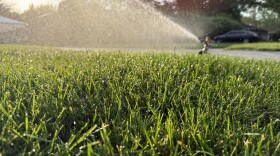-
In Early, Iowa, residents check their Facebook to see if their water is safe to drink. On this News Buzz edition of River to River, Sentient Media's Nina Elkadi shares her investigation into nitrate pollution in small towns' tap water. But first, Robin Opsahl of Iowa Capital Dispatch gives us a statehouse update. Also, Iowa Capital Dispatch's Cami Koons talks about a controversial piece of legislation that could change how Iowa's impaired waters list is managed. Iowa’s State Climatologist Justin Glisan explains this year’s snow drought and its consequences. Finally, we groove into the weekend with Studio One's CeCe Mitchell with new tracks from Buck Meek and Dogpark.
-
Elevated nitrate levels in the Des Moines and Raccoon rivers prompted Central Iowa Water Works to start up its nitrate removal system this month. A network of water quality sensors shows a similar uptick in other streams and rivers across state.
-
Iowa cities are receiving significant settlements from chemical companies to address "forever chemical" contamination in drinking water. But officials caution that the funds may not cover all associated costs, as long-term solutions remain uncertain.
-
Scientists discussed pollution, bacteria and other challenges plaguing central Iowa's rivers at an event in Des Moines Monday. The presenters contributed to a two-year assessment of the Des Moines and Raccoon rivers, which includes recommendations at the local, regional and state level.
-
Nitrates, fecal bacteria, sediment and other pollutants in the Des Moines and Raccoon rivers threaten safe drinking water for 20% of the state’s population. That's one of the findings from a sweeping study commissioned by Polk County supervisors.
-
The Des Moines area’s first-ever lawn watering ban helps Central Iowa Water Works keep up with nitrate removal to provide safe drinking water to 600,000 people. Over the next decade, CIWW aims to increase its treatment capacity by 25%.
-
Nitrate levels are still at dangerous levels in Des Moines’ rivers. To keep the area’s sources for drinking water from exceeding EPA standards, Central Iowa Water Works is continuing its ban on lawn watering, possibly for weeks.
-
What would happen if fluoride were removed from drinking water? Scientists weigh in.
-
The U.S. Environmental Protection Agency said nitrate and nitrite levels in six sections of the Cedar, Des Moines, Iowa, Raccoon and South Skunk rivers exceed safe drinking water standards and need to be curtailed.
-
A new DNR program helps monitor for PFAs in water supplies, an update on the Cedar Rapids Cargill strike and discussing the aftermath of Hurricane Helene.
Play Live Radio
Next Up:
0:00
0:00
Available On Air Stations







